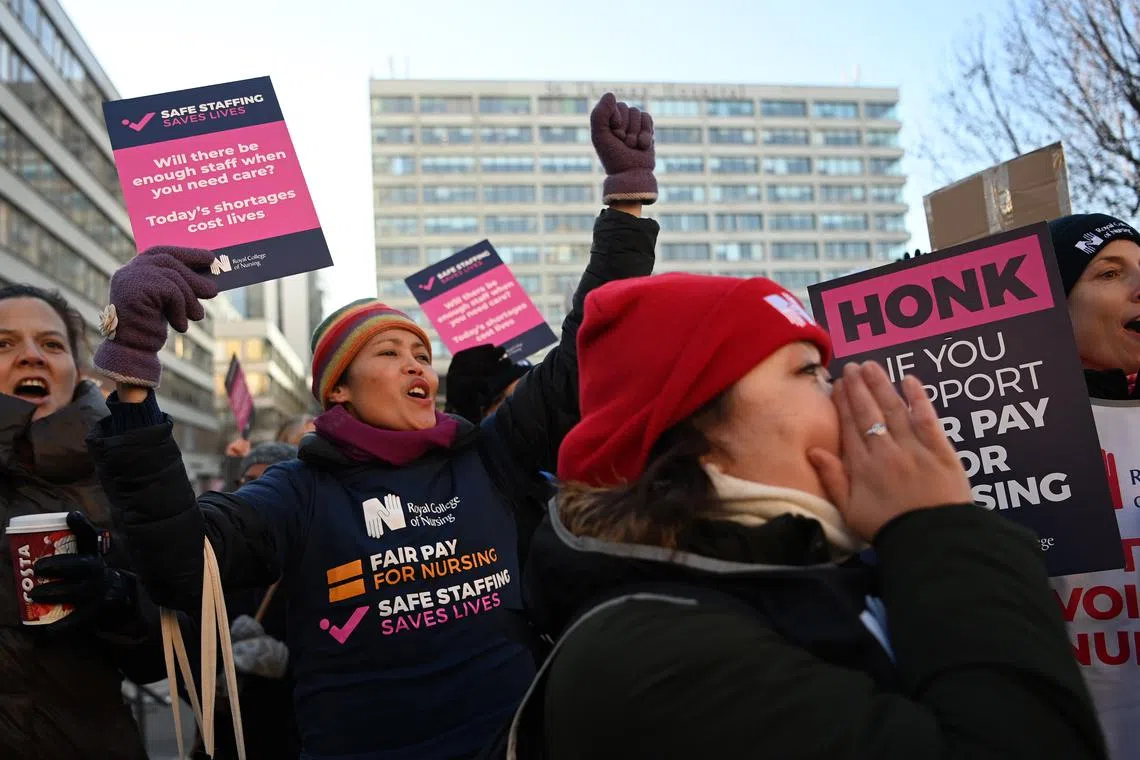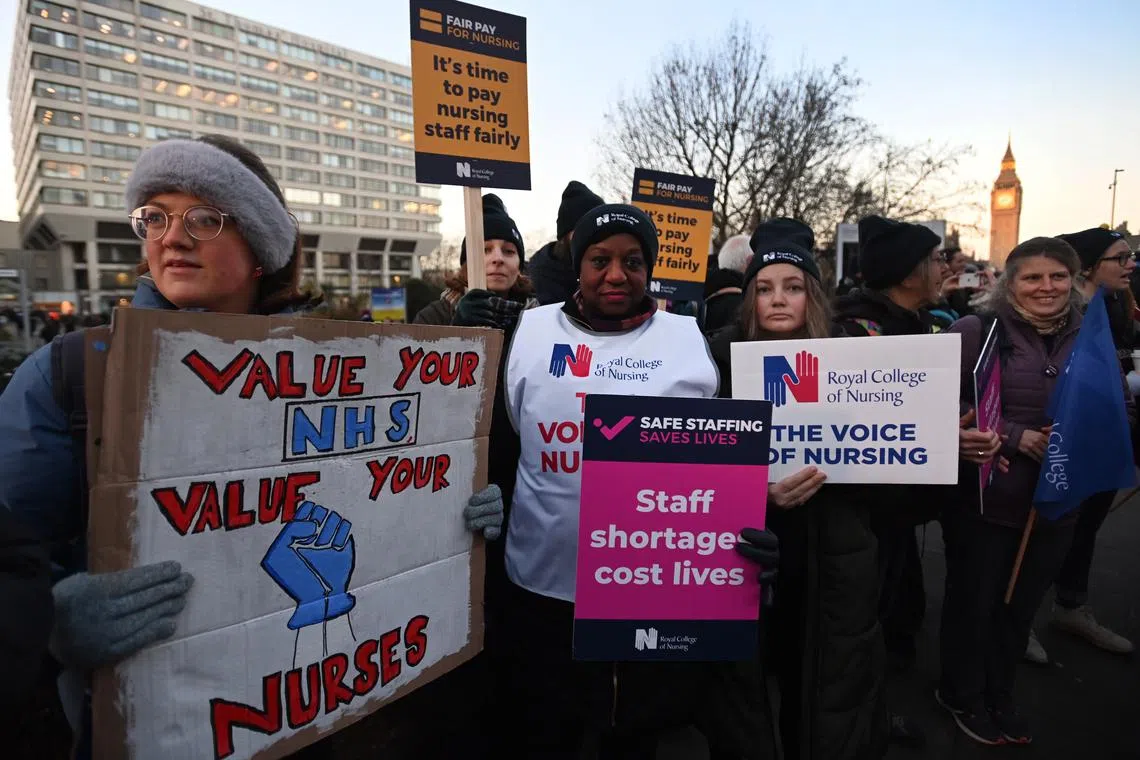British nurses stage fresh strike, issue ultimatum to Sunak govt
Sign up now: Get ST's newsletters delivered to your inbox
LONDON - Britain’s nurses’ union issued an ultimatum to the government on Tuesday to respond to its pay demands or face further strike action in January as staff walked out for the second time in a week, piling pressure on ministers to act.
Ambulance staff in England and Wales are set to follow suit on Wednesday and Dec 28, leaving those with all but the most life-threatening conditions to make their own way to hospital. Other workers, including postal, railway and Border Force staff, are also staging stoppages over the Christmas period.
The industrial action by up to 100,000 nurses is unprecedented in the British nursing union’s 106-year history, but it says it has no choice as the soaring cost of living leaves workers struggling to make ends meet.
The Royal College of Nursing (RCN) union, which says its members’ real-term earnings have fallen by 6 per cent in the last decade, has called for a pay rise of 5 per cent above the retail price index rate of inflation, which stood at 14 per cent in November.
The government has offered nurses around 4 per cent on average, on the recommendation of an independent pay review body, and has declined to discuss pay further.
Prime Minister Rishi Sunak says the nurses’ demands are unaffordable.
On the eve of the nurses’ latest strike, he insisted the government has adopted a “responsible and fair approach” to public sector pay.
“When it comes to pay, it’s because these things are difficult that we have an independent process,” he said while on a visit to Latvia.
Mr Sunak was set to be quizzed by a cross-party watchdog panel of lawmakers on Tuesday, with the issue of strikes likely to feature.
“I will negotiate with him at any point to stop nursing staff and patients going into the new year facing such uncertainty,” RCN head Pat Cullen said.
“But if this government isn’t prepared to do the right thing, we’ll have no choice but to continue in January.”
The union has also accused Health Secretary Steve Barclay of adopting a “macho” negotiating style during brief meetings held recently.
“The RCN’s demands are unaffordable during these challenging times and would take money away from frontline services while they are still recovering from the impact of the pandemic,” Mr Barclay said on Monday.
The RCN has given the government 48 hours from the end of Tuesday’s strike to respond before it announces further dates.
“Our door is open to discuss with the unions anything relating to working conditions. What we can’t do is go back into reopening the pay award,” junior health minister Will Quince told Sky News.
The strikes are putting extra pressure on healthcare provision in the state-funded National Health Service when it is already stretched by staff shortages and record backlogs due to Covid-19 delays.
“Our members are tired of going to work every day and, in some cases, spending the whole of their shift sat on an ambulance outside an A&E department with the same patient,” Ms Rachel Harrison, GMB union public services national secretary, told a committee of lawmakers on Tuesday.
“We’ve had examples where our members have clocked off at the end of one shift to return the following day to the same patient being on that ambulance.”
The military has been put on standby to help drive ambulances, although its drivers will not have the powers that regular emergency vehicle drivers do.
Ministers are meeting unions on Tuesday to discuss which emergencies ambulances will still respond to, amid media reports that those suffering heart attacks or strokes may be left to make their own way to hospital.
“I’ve been absolutely clear with the unions... that life-threatening and emergency situations must be covered as part of minimum service level guarantees, and we’ll be repeating that expectation later,” Mr Quince told the BBC.
The government has said it is looking at introducing new anti-strike legislation next year, which could include banning strike action in key sectors. REUTERS, AFP
British nurses on Tuesday staged a second unprecedented strike amid an increasingly acrimonious fight with the government for better wages
Up to 100,000 members of the Royal College of Nursing (RCN) in England, Wales and Northern Ireland are holding the latest one-day stoppage after walking out last Thursday for the first time in the union’s 106-year history.
They are demanding an inflation-busting pay increase
The striking nurses are just one of numerous British public and private sector workers taking industrial action over pay and working conditions, as they grapple with a cost-of-living crisis worsened by decades-high inflation.
The British consumer prices index is currently running at nearly 11 per cent.
Ambulance workers, including paramedics and call handlers, are set to strike on Wednesday.
A second such walkout is scheduled for Dec 28, while others, including postal, railway and Border Force staff are staging stoppages over the Christmas period.
The RCN has criticised Prime Minister Rishi Sunak’s government for refusing to discuss pay as part of stalled negotiations to end the dispute, and warned the strikes could be repeated in the coming months.
“The only reason we’re entrenched is that we’ve got no one to talk to about what the issue is,” the union’s director in England, Ms Patricia Marquis, told Times Radio on Monday.
“Sadly, if there is no resolution, then our members have taken a vote to take strike action and the mandate that lasts for six months.”

The nurses are demanding an inflation-busting pay increase to make up for years of real-terms salary cuts.
PHOTO: EPA-EFE
He and other ministers have reiterated that they can only accept the recommendations of an independent pay review body.
The government-appointed body, comprised of economists and human resources experts, urged hiking healthcare sector pay at least £1,400 (S$2,300) on top of a 3.0 per cent increase last year.
But critics argue it is constrained by government-imposed budget limits and that its assessment, published in July, predates current higher inflation rates.

Britain’s PM Rishi Sunak insisted the government has adopted a “responsible and fair approach” to public sector pay.
PHOTO: EPA-EFE
Ministers from various departments held their latest contingency meeting Monday as they bid to mitigate the fallout from the growing number of public sector strikes.
They plan to draft in 750 military personnel to drive ambulances and perform logistics roles.
A further 625 soldiers will be involved in “contingency planning” to replace Border Force staff striking over numerous days from Friday through to New Year’s Eve.
Despite the government’s dogged insistence it will not negotiate over pay, polls indicate the majority of people support the nurses’ stance, and to a lesser extent other workers walking out.
YouGov polling during December reported by The Sunday Times showed nearly two-thirds back the nurses, while half are supportive of ambulance staff stoppages.
However, after a year of strikes on the railways, only 37 per cent backed its workers amid their ongoing dispute over pay and conditions. AFP


